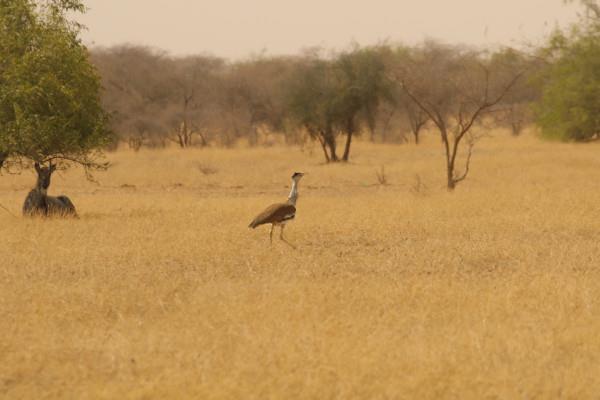
UAE- Success for Houbara Fund, Wildlife Institute of India in bustard conservation project
(MENAFN- Emirates News Agency (WAM)) ABU DHABI, 19th April, 2020 (WAM) -- A major milestone has been reached in collaboration between the Abu Dhabi-based International Fund for Houbara Conservation, IFHC, and the Wildlife Institute of India, WII, to preserve two of the world's rarest bird species, it has been announced.
Through the Conservation Department of the Indian state of Rajasthan, the two organisations are currently working to protect the Great Indian Bustard and the Lesser Florican, members of the bustard family, both of which are in danger of extinction.
The bustard family includes a total of 26 species, including the Asian and North African houbara.
With just 160 birds estimated to remain in the wild in India, the Great Indian Bustard is listed as Critically Endangered by the International Union for the Conservation of Nature, IUCN, and was chosen as the priority species for 2019 conservation efforts.
Ten eggs of the Great Indian Bustard were collected last year in Rajasthan. Following the implementation of the Fund's houbara conservation breeding programme, the collaborative efforts resulted in the hatching of nine chicks in captivity. It is the first time that successful artificial incubation of the eggs of the species has been achieved.
"These two birds are symbols of Indian heritage and the threat of extinction is real. As the leader in global species conservation, we could not stand by and watch this happen. We praise the Wildlife Institute of India and the state of Rajasthan in recognising the need for pre-emptive action to preserve and protect these important species," Majid Al Mansouri, IFHC Managing Director, said.
"Our team on the ground in Rajasthan tracked wild populations to gain a better understanding of Great Indian Bustard behaviour in their natural environment, and the Fund will advise on best practice moving forward," Al Mansouri added.
"There is a long way to go, but this is an excellent start to what will be a long-term project to save these remarkable birds."
Both the Great Indian Bustard and the Lesser Florican were formerly widespread in India and Pakistan. The Great Indian Bustard has disappeared from around 90 per cent of its previous range. Its wild population was estimated at 250 in 2011, and has now fallen by around 40 per cent. The Lesser Florican, classified by IUCN as Endangered, is estimated to have only 1,500 birds surviving in the wild.
As part of its collaboration, IFHC has leveraged its expertise in species conservation to become the knowledge and technical partner of the Wildlife Institute of India in this programme. In particular, the IFHC scientific team brought support and expertise in tracking wild populations of the Great Indian Bustard in their natural habitat, in searching for nests, in the collection of eggs from the wild, as well as their transport and incubation, and in captive-breeding design and techniques.
IFHC's team of specialist scientists have also trained the personnel implementing the breeding programme, both at the Great Indian Bustard breeding facility at Sam, in Rajasthan, and at IFHC's own breeding facilities, The IFHC's captive breeding programme has resulted in the breeding of more than 480,000 Asian and North African houbara chicks in the last 20 years, over 285,000 of which have been released into the wild.
In addition to lending its scientific expertise to the initiative, IFHC is also playing a leading role on the steering committee which will define the conservation programme.
Efforts will continue this year to build a captive stock for the Great Indian Bustard. In the future, this will allow for suitable birds to be raised for reintroduction operations. Conservation actions for the Lesser Florican will start this year The early success of the project has drawn high praise, with Indian Prime Minister Narendra Modi referring to the work of IFHC and the Wildlife Institute of India during his video address to the 13th Conference of Parties (COP) of the Convention on the Conservation of Migratory Species of Wild Animals (CMS) in Ghandhinagar, India in February this year.
.gif)
Legal Disclaimer:
MENAFN provides the
information “as is” without warranty of any kind. We do not accept
any responsibility or liability for the accuracy, content, images,
videos, licenses, completeness, legality, or reliability of the information
contained in this article. If you have any complaints or copyright
issues related to this article, kindly contact the provider above.
















Comments
No comment